Israel Says Hamas Had Instructions To Make Cyanide Bombs
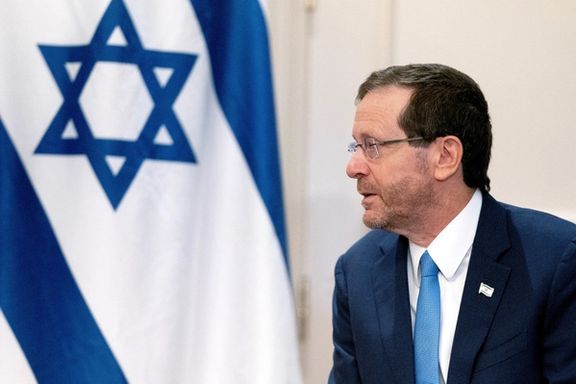
Israeli President Isaac Herzog has revealed that Hamas terrorists responsible for the October 7 massacre in Israel were carrying instructions for using cyanide bombs.

Israeli President Isaac Herzog has revealed that Hamas terrorists responsible for the October 7 massacre in Israel were carrying instructions for using cyanide bombs.
Herzog said the Israel Defense Forces (IDF) discovered a USB drive on one of the dead militants containing instructions for constructing a cyanide dispersion device.
The surprise attack on October 7 when thousands of terrorists infiltrated Israel after thousands of rockets rained down from Gaza, saw over 1,400 civilians slaughtered and hundreds more soldiers. At least 212 hostages are now being held by Hamas in the Gaza Strip.
During an interview with the Sky News, Herzog said the origin of the instructions could possibly be traced back to a 2003 Al Qaeda blueprint for chemical weaponry.
Herzog stated, "It's Al Qaeda material. Official Al Qaeda material. We are dealing with ISIS, Al Qaeda, and Hamas."
"What we went through is evil. We have to uproot it, and when you uproot evil, you see people supporting evil, you see them in demonstrations in London or anywhere else in the world. Why are you supporting evil? What's the story? Do you really believe that human beings need to be tortured? Civilians, pregnant women?" he added.
With the majority of Hamas' capabilities coming from its main backer, Iran, the link to cyanide capabilities coming from the regime cannot be ruled out either with the regime having long links to chemical warfare.
A 1990 US Department of Defense report concluded that both Iran and Iraq used chemical weapons in Halabja during the Iran-Iraq war. Iran allegedly attacked the town with cyanide gas bombs and artillery, and Iraqi forces allegedly used a mixture of mustard gas and nerve agents.
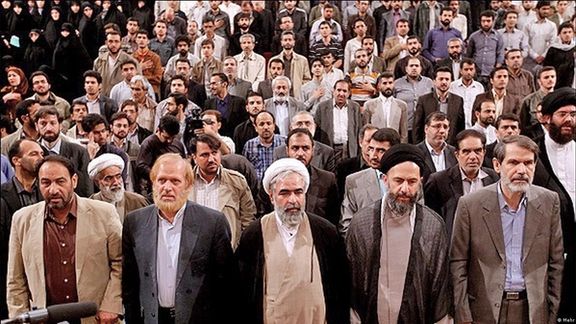
Leaders of Iran’s ultra-hardliner Paydari (Steadfastness) Party have been conspicuously silent about the war in Gaza despite being vocal about domestic issues.
The secretary general of the party, Sadegh Mahsouli, and the chairman of the party’s central council, Morteza Aghatehrani, have not made any public comments about the war raging in the Middle East. Considering that they are close allies with many top officers of the Revolutionary Guard, the reason for their silence remains a mystery.
The Paydari party has its tentacles in all government institutions including the parliament where their members form a very influential minority that often takes a leading role amid the weak presence of established conservative and reformist parties.
Paydari, which has always expressed maximum hostility towards Israel, however, in a statement earlier this month called the Hamas attack on Israel a “triumphant” operation and congratulated the “Palestinian resistance groups’ command”.
Mahsouli and Aghatehrani’s silence is particularly notable, as many other politicians -- including reformists such as the former President Mohammad Khatami whose rhetoric against Israel is generally very mild in comparison with hardliners -- have extensively condemned Israel in the past two weeks.
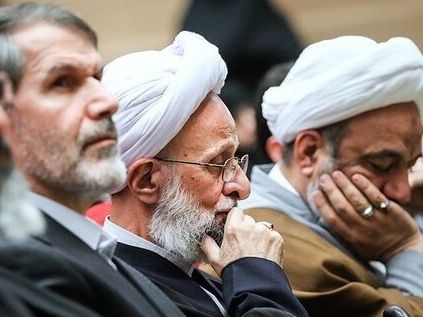
Mahsouli, a former Revolutionary Guard officer and a business tycoon who served in the government of the hardliner President Mahmoud Ahmadinejad as minister of interior and minister of welfare and social security, has been the party’s leader in the past three years.
Many believe Mahsouli, then interior minister, was the man behind the alleged rigging of the 2009 elections which secured a second term for the incumbent Mahmoud Ahmadinejad. He is among the officials of the Islamic Republic designated by the European Union.
Aghatehrani who is the chairman of the parliament’s cultural committee this week spoke to the media about the upcoming elections of the parliament and Assembly of Experts in March.
The Assembly, a constitutional body, is tasked with selecting the Islamic Republic’s next supreme leader. Reformists allege the party is planning to manipulate the assembly’s elections to suit its own interests.
Aghatehrani is known for having been a protégé of Ayatollah Mohhammad-Taqi Mesbah-Yazdi. The sixty-six-year-old cleric studied at Canada’s McGill; a university very popular with Mesbah-Yazdi’s circle in the early 1990s.
Aghatehrani then obtained a US Green Card while studying for a PhD in Middle East Studies at the State University of New York at Binghampton. There, he founded the Islamic Institute of New York and Razi Islamic school in Woodside.
Aghatehrani returned to Iran and to Mesbah-Yazdi’s famous Imam Khomeini Institute, a seminary in Qom, in 2004. A year later when Ahmadinejad was first elected to presidency, Aghatehrani was invited to join his government as the cabinet’s “ethics teacher”.
The party, and Aghatehrani as a lawmaker, are said to be behind a drive to purge government institutions of all rival factions and “Islamization” of the Iranian society including imposing tighter control on universities and other educational institutions, strict enforcement of compulsory hijab, and controlling the media and the cyberspace.
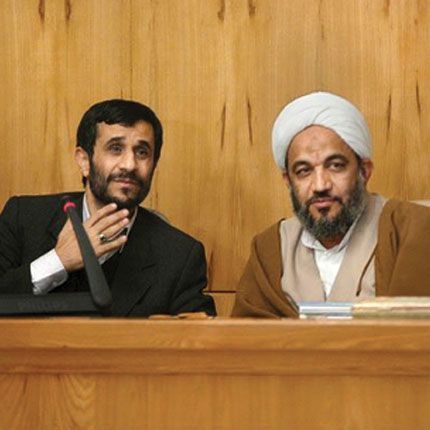
The drive to establish Paydari’s monopoly in the government and higher education came to be known as “the purification project.” Former parliament speaker and moderate conservative Ali Larijani, who among others oppose hardliners and are seen as centrists in Iranian politics, coined the term in May indirectly attacking the Paydari.
Paydari members had circulated a rumor that Larijani was trying to head an electoral block for the March parliamentary elections. “There is no talk about the elections or a nationwide slate, nor is there any consultation with other [political groups]. Therefore, the purification [-seeking] current need not worry,” Larijani responded in a brief letter and added that his ultra-hardliner rivals who blocked him from running in the presidential elections of 2020 could not expect to “create fake rivalry” and interest in the parliamentary elections.
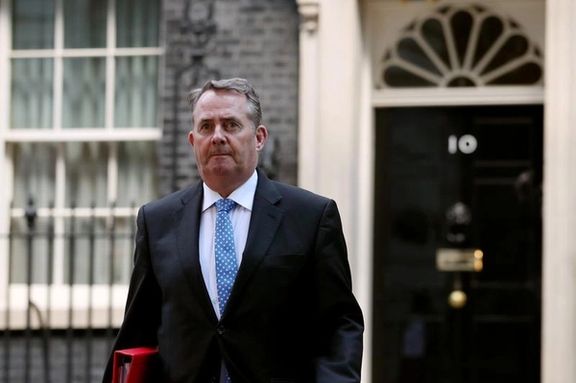
While Iran continues to deny its involvement, Liam Fox, the former UK defense secretary, has accused Iran of orchestrating its proxy Hamas's war on Israel.
"If the fingers on the trigger were Hamas’s, the strings were being pulled from Tehran," he said, calling for the UK to designate the Islamic Revolutionary Guards Corps (IRGC) which controls Iran's many proxies across the region.
The UK's counter-extremism commissioner, Robin Simcox, also had a similar stance, saying that continued legal support for the IRGC would not be sustainable. The IRGC has been designated as a foreign terrorist organization (FTO) by the US State Department since April 2019, but the UK has yet to do so.
Fox criticized the UK for failing to list the IRGC as a terrorist group, despite the fact that "£100 million of investment goes from Tehran to Hamas terrorists" annually and called for closing Iranian banks that operate from the City of London and stopping Iran Air flights from Heathrow.
The UK has imposed sanctions on Iranian individuals and entities since Mahsa Amini's death in September 2022 as a response to human rights violations committed by the regime's IRGC forces. But, proscription would have made belonging to the group, funding it, or expressing support for its activities in the UK criminal.
The British government exacerbated sanctions, pledging to step up protection for Iranian journalists based in the United Kingdom, following the suspension of Iran International's UK operations due to continued threats to its employees and based on advice from the London Metropolitan Police.
The Iranian government has repeatedly threatened Iran International and other Persian broadcasters based abroad.
The refusal to proscribe the IRGC has caused sharp political criticism, as the opposition Labour Party calls for its proscription under the 2000 Terrorism Act.
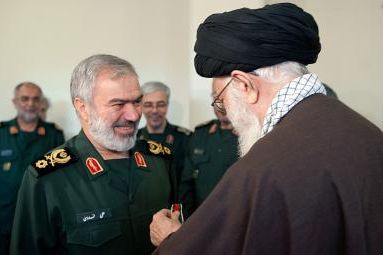
Ali Fadavi, the deputy commander of the IRGC, has joined regime threats of an offensive against Israel, naming the mixed city of Haifa as a target, where around 20 percent of its citizens are Muslim.
Though he asserted that the decision is not his to make, the talks of action on Israel's northern front, following Hamas' declaration of war against Israel on October 7, it will be further warning that all civilians in Israel remain at risk as Iran's largest proxy Hezbollah gears for war.
“Some consider a direct missile attack on Haifa to be the most practical course of action. We will carry out this task without hesitation if it is necessary and required," said Fadavi. "However, I am not the one who determines the assignment.”
He made the remarks at a gathering of students supporting Gaza at the Tehran University Mosque, though last week also threatened of “another shockwave” if Israel does not end "atrocities" in Gaza, referring to the bombardment of Israeli air strikes beating down on the strip after Hamas' massacre of Israeli civilians on October 7.
Since Hamas' surprise assault on Israel which saw over 1,400 civilians slaughtered by Hamas terrorists, plus hundreds more soldiers, Iran's threats did not outline a clear detailed plan of action. However, the acting IRGC Commander has stated a very direct warning on Israeli lands, threatening to activate its proxies not only on Israel's borders, but as far afield as Yemen. Just days ago, the US intercepted Houthi missiles from Yemen on their way to Israel, showing the Iranian proxy network is on full alert.
The Iran-allied militias have also begun attacking US troops' bases in Iraq and Syria as the conflict begun by Hamas spreads further afield.
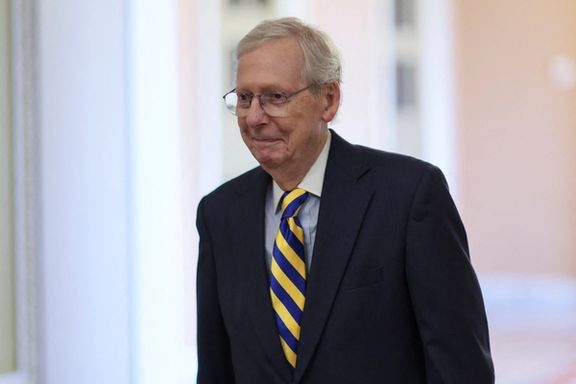
Senate Minority Leader Mitch McConnell has branded China, Russia, and Iran as the new "axis of evil" and Iran the "principal sponsor of terrorism".
The designation comes in the midst of ongoing conflicts in Ukraine and Israel and discussions surrounding US funding for allies involved in the two wars.
In a recent interview with Fox News, McConnell, A Republican from Kentucky, described the "axis of evil" consisting of China, Russia, and Iran as an immediate threat.
"You have to respond to conditions that actually exist that are a threat to the United States. The Iranians are a threat to us as well. And so, this is an emergency. It’s an emergency that we step up and deal with this axis of evil – China, Russia, Iran – because it’s an immediate threat to the United States," McConnell said.
"In many ways the world is more endangered today than it has been in my lifetime," McConnell said, recalling that unlike when the Berlin Wall fell, the world faces a "big power competition" coinciding with the terrorism threats in the Middle East and culminating in Israel's war against Iran-backed Hamas terrorists who on October 7 declared war on Israel.
He said that the "disastrous" withdrawal from Afghanistan gave a "green light of " to Putin's invasion of Ukraine and now, as the Middle East awaits the wrath of Iran's proxies, he asked "is America going to lead?".
Calling out Iran as "the principal sponsor of terrorism", supporting Russia's invasion of Ukraine and now, Hamas in Gaza and Hezbollah in Lebanon, whose attacks have stepped up massively in recent days into Israel's northern border, he said the threat is spreading globally.
US Senator Lindsey Graham during a visit to Israel on Sunday accused Iran of involvement in the October 7 Hamas attack and warned that any escalation could exact a cost from Tehran.
"We're here today to tell Iran: 'We're watching you. If this war grows, it's coming to your backyard,'" Graham starkly warned.
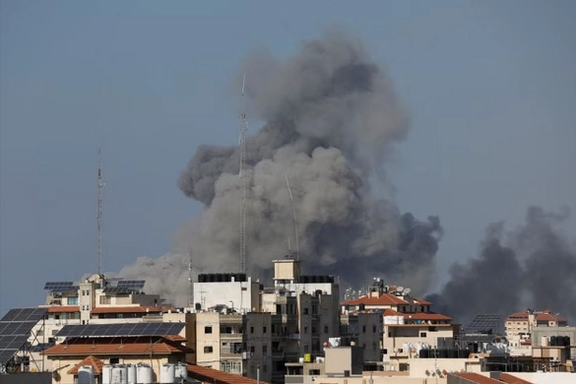
US Secretary of State Antony Blinken has warned that Iran-backed militant groups may escalate their activities against American forces in the Middle East.
Houthis in Yemen and Hezbollah in Lebanon, both propped up by the regime in Iran have already launched limited attacks against Israel.
"There's a likelihood of escalation by Iranian proxies against our forces," Blinken cautioned in an NBC interview. "We're taking steps to make sure that we can effectively defend our people and respond decisively if we need to."
Blinken's alert came as the Pentagon announced measures to tackle growing threats from Iran proxies in the region, including the deployment of a new warship and anti-missiles systems.
Secretary of Defense Lloyd Austin said Saturday that he had made these decisions after detailed discussions with President Joe Biden, and aiming to bolster regional deterrence, enhance US force protections, and contribute to the defense of Israel.
Last week a squadron of B1b Lancer strategic bombers were moved from their Texas base to the Fairford base in Britain. The bombers can carry 50 tons of bombs each and have enough range from Britain to Lebanon/Iran and back.
In the week gone by, Houthis in Yemen and Hezbollah in Lebanon, both supported by the regime in Iran, have entered the war theater, albeit on a limited scale and with no official declaration of war.
The heightened tension and the attacks on US forces by emboldened Iran-backed militants caused the US embassy in Baghdad to order the evacuation of non-essential personnel after recent attacks by Iran’s proxy forces across the Middle East, reports Fox News.
On Sunday, one Israeli soldier was killed in a local IDF raid into Gaza. Several others were injured. The operation was reportedly conducted to locate missing individuals and dismantle Hamas infrastructure but met ‘unexpected resistance.’
Only a day prior, Iran's intelligence chief had issued a warning, suggesting potential reprisals against the US and its allies and unconfirmed reports emerged that IRGC Quds Force Commander Ismail Qaani traveled to Syria to “supervise” the Iran-backed armed groups along the Syrian border with Israel.
Israel has amassed its forces on the border with Gaza but has so far refrained from a full-on ground invasion, apparently heeding the Biden administration’s advice.
Critics of President Biden say he is to blame (partly at least) for the critical situation in the Middle East, pointing, especially, to his lenient approach towards the regime in Iran.
John Ratcliffe, former Director of National Intelligence, accused the Biden administration of ignoring the ‘intelligence’.
“Throughout 2020, Iranian military and political leaders were telling us as we listened to their conversations, we’re broke, we can’t afford to fund Hamas, we can’t afford to fund Hezbollah,” Ratcliff said in an interview with Fox News, “essentially saying that the maximum pressure campaign of the Trump administration was working, and Iran was less dangerous than they had been at any point in time.”
Ratcliffe then suggested that all the intelligence had been shared with the Biden administration ‘as it came into office.
Amid the escalation, diplomatic and humanitarian efforts are gaining momentum. President Biden held critical discussions with Israeli Prime Minister Benjamin Netanyahu, underlining the need for a sustained flow of humanitarian assistance into Gaza and the release of hostages held by Hamas, including US citizens, before a land invasion.
However, aid agencies have expressed concerns about the inadequacy of the humanitarian aid reaching Gaza, with the limited number of trucks permitted into the region falling far short of the pressing need for essential supplies, including food, fuel, and medical resources.
Since October 7, when Hamas special forces attacked Israel, at least 1400 Israelis and 4500 Palestinians have been killed, many more injured and displaced.